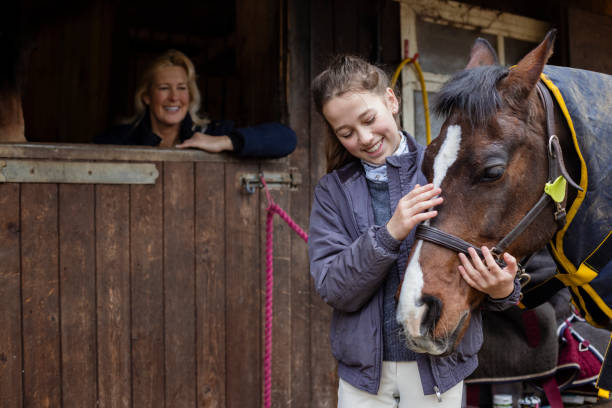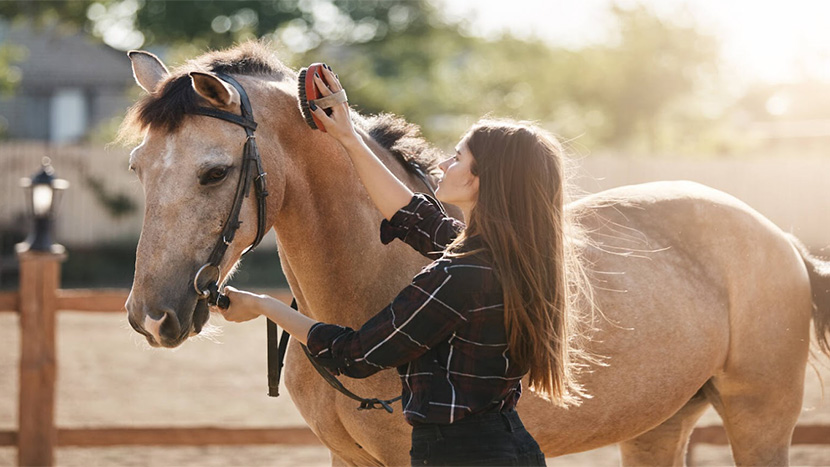The health of a horse’s skin is vital to its overall well-being, especially when it comes to senior horse skin conditions. As horses age, their skin can become more susceptible to various conditions that require careful attention and management. Understanding these conditions is crucial for ensuring that your senior horse leads a comfortable and healthy life.

Common Skin Conditions in Senior Horses
As horses age, their skin undergoes changes that can lead to several common conditions. Recognizing these conditions early can make a significant difference in how effectively they are managed.
Dermatitis in Older Horses
One of the most prevalent skin conditions in senior horses is dermatitis. This condition causes inflammation of the skin, often resulting in itching and discomfort. It can be triggered by various factors, including allergies, infections, or environmental irritants.
The Impact of Sweet Itch
Sweet itch is another condition that affects older horses. It is an allergic reaction to insect bites, leading to intense itching and skin irritation. Without proper management, sweet itch can severely affect a horse’s quality of life.
Understanding Rain Rot
Rain rot, also known as rain scald, is a bacterial infection that occurs when a horse’s skin remains wet for extended periods. This condition is characterized by crusty scabs and lesions, which can be painful for the horse.
Causes of Senior Horse Skin Conditions
Several factors contribute to the development of skin conditions in senior horses. Understanding these causes can help in preventing and managing these issues effectively.
Environmental Factors
Environmental elements such as humidity, extreme temperatures, and exposure to insects can significantly impact a horse’s skin health. Ensuring that your horse’s environment is controlled and comfortable is essential. For more on managing environments for senior horses, you can refer to Pasture Management.
Dietary Considerations
A balanced diet plays a crucial role in maintaining healthy skin. Nutrient deficiencies can weaken the skin’s natural barriers, making it more prone to infections and irritations. For guidance on feeding your senior horse, visit Best Bedding.
Age-Related Changes
As horses age, their skin becomes thinner and less elastic. This natural aging process makes them more vulnerable to injuries and infections.
Preventing Skin Conditions in Senior Horses
Prevention is always better than cure. By taking proactive measures, you can reduce the risk of your senior horse developing skin conditions.
Regular Grooming
Regular grooming helps keep your horse’s skin clean and free of debris. It also allows for early detection of any abnormalities or issues.
Maintaining a Clean Environment
Keeping your horse’s living area clean and dry is essential in preventing bacterial and fungal infections. Consider regular cleaning routines and proper ventilation.
Optimizing Diet and Nutrition
Ensuring your horse receives adequate nutrition is key to maintaining healthy skin. Consult with a veterinarian to tailor a diet specific to your horse’s needs.
Treatment Options for Senior Horse Skin Conditions
When prevention is not enough, treatment becomes necessary. There are several options available to manage and treat skin conditions in senior horses.
Topical Treatments
Topical ointments and creams can be effective in treating localized skin issues. These treatments can help soothe irritation and promote healing.
Medications
In some cases, medications such as antihistamines or antibiotics may be necessary to manage more severe conditions. Always consult with a veterinarian before administering any medication.
Alternative Therapies
Some horse owners explore alternative therapies such as acupuncture or herbal remedies to complement traditional treatments. It’s important to discuss these options with a professional to ensure their safety and effectiveness.
Consulting with a Veterinarian
Regular veterinary check-ups are crucial for maintaining your horse’s skin health. A veterinarian can provide valuable insights and recommendations tailored to your horse’s specific needs.
Conclusion
Understanding and managing senior horse skin conditions is essential for ensuring the health and comfort of your aging equine companion. By taking proactive measures and seeking professional guidance, you can help your senior horse maintain healthy skin and enjoy a high quality of life. For more tips on caring for senior horses, visit the American Association of Equine Practitioners.

FAQs
What are the most common skin conditions in senior horses?
Senior horses are often affected by dermatitis, sweet itch, and rain rot. These conditions can cause discomfort and require proper management.
How can I prevent skin conditions in my senior horse?
Preventive measures include regular grooming, maintaining a clean environment, and providing a balanced diet tailored to your horse’s needs.
When should I consult a veterinarian about my horse’s skin condition?
If you notice persistent irritation, swelling, or unusual changes in your horse’s skin, it’s important to consult a veterinarian for a professional assessment.
This article contains affiliate links. We may earn a commission at no extra cost to you.
